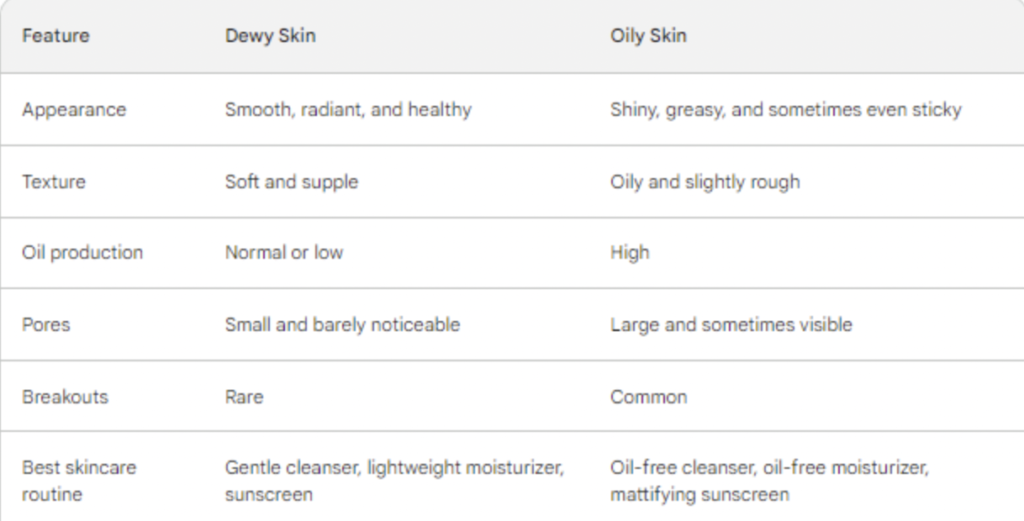There is a battle raging on the faces of women regarding, “Dewy Skin vs Oily Skin: What’s The Difference?” everywhere. On one side, we have dewy skin, the epitome of health and radiance. On the other side, we have oily skin, the bane of many a makeup wearer’s existence. But what is the difference between these two skin types? And which one is better?
Dewy skin is characterized by a healthy glow that comes from being properly hydrated. It is often described as looking “fresh” or “plump.” Oily skin, on the other hand, is characterized by an excess of oil production. This can lead to a shiny appearance, as well as clogged pores and breakouts.
So, which skin type is better? It really depends on your personal preferences. If you prefer a natural, healthy look, then dewy skin is the way to go. But if you have oily skin, it can be difficult to achieve a dewy look without making your skin look even oilier.
The good news is that there are steps you can take to control your oil production and achieve a dewy look, even if you have oily skin. With the right skincare routine and makeup products, you can have the best of both worlds: healthy, hydrated skin that looks dewy and radiant. However, in this article, we will draw the differences between these two phenomena. So, let’s dive in.
Dewy Skin: Characteristics and Features
Dewy skin refers to a skin texture and appearance that appears fresh, hydrated, and radiant, as if there’s a delicate layer of dew on the surface. It’s a popular makeup and skincare trend aimed at achieving a natural, healthy, and youthful glow.
Dewy skin is often contrasted with matte skin, which has a more flat, shine-free finish. Here are some characteristics and features associated with dewy skin.
Radiance and glow
With its luminous and radiant demeanor, dewy skin is renowned. Casting forth light, it bestows upon the skin a robust, youthful luminosity, culminating in a complexion that’s both invigorating and lively.
Hydration
Hydration is key to achieving dewy skin. Well-moisturized skin retains water and looks plump, smooth, and supple. Hydrated skin also helps to reduce the appearance of fine lines and wrinkles.
Natural sheen
A natural radiance graces dewy skin, presenting a subtle luster that avoids excessive shine. This luminosity emanates courtesy of the skin’s inherent oils and moisture, occasionally accentuated by cosmetic items such as highlighters or illuminators.
Minimal pores
The presence of smaller pores is often associated with dewy skin, attributed in part to the skin’s hydration and fullness. This combination contributes to a reduced visibility of pores, making them appear less pronounced.
Even complexion
Commencing with a radiant glow, dewy skin showcases an even complexion while minimizing redness, discoloration, and blemishes. This desirable consistency can be fostered through adequate skin hydration and a well-structured skincare routine.
Freshness
Dewy skin looks fresh and awake. It can make you appear more vibrant and well-rested, even if you’re dealing with tiredness or stress.
Less makeup
Achieving dewy skin often involves using less heavy makeup, such as full-coverage foundation and matte powders. Instead, lighter makeup products like tinted moisturizers or sheer foundations are often used to allow the natural skin texture to shine through.
Highlighting
To enhance the dewy effect, highlighters are often strategically applied to the high points of the face, such as the cheekbones, bridge of the nose, and cupid’s bow. This accentuates the natural light-catching areas of the face.
Skincare routine
A consistent skincare routine is essential for maintaining dewy skin. This may include using hydrating serums, moisturizers, and facial oils to lock in moisture and promote skin health.
Healthy lifestyle
Nurturing dewy skin from within involves maintaining a balanced diet, staying properly hydrated, ensuring sufficient sleep, and engaging in regular exercise.
Oily Skin: Characteristics and Features
Oily skin is a common skin type characterized by an overproduction of sebum, the skin’s natural oil. Sebum is produced by the sebaceous glands, which are located in the dermal layer of the skin.
While sebum is important for maintaining skin hydration and protecting it from external factors, excessive production can lead to oily skin and related issues. Here are the main characteristics and features of oily skin.
Excess sebum production
The hallmark of oily skin is the overproduction of sebum. This can result in a shiny or greasy appearance, especially in the T-zone (forehead, nose, and chin) of the face.
Shiny appearance
Oily skin often appears shiny, particularly a few hours after cleansing or during warmer weather. The excess sebum on the skin’s surface reflects light, contributing to the shine.
Enlarged pores
Oily skin tends to have larger pores. These pores can become clogged with excess sebum, dirt, and dead skin cells, leading to blackheads, whiteheads, and acne breakouts.
Acne prone
Oily skin is more prone to acne because the excess sebum can mix with dead skin cells and bacteria, leading to clogged pores and inflammation. This can result in various forms of acne, including pimples, pustules, and cysts.
Makeup and products
Makeup and skincare products might not adhere well to oily skin, causing them to wear off more quickly. Additionally, using heavy or oil-based products can exacerbate the shine and clogging of pores.
Skin texture
Oily skin can have a slightly thicker texture due to the excess sebum and buildup of dead skin cells. This might result in a less smooth or refined appearance.
Sensitivity to Weather: Oily skin can be sensitive to changes in weather and humidity. During humid conditions, the excess moisture in the air can interact with the skin’s natural oils, making the skin feel even oilier.
Mattefying throughout the day
Those with oily skin often find themselves blotting their face with tissue or using oil-absorbing sheets to remove excess oil and reduce shine during the day.
Genetic factors
Genetics play a role in determining skin type, including whether a person will have oily skin. If your parents or close relatives have oily skin, you’re more likely to have it as well.
Age and hormones
Oily skin is more prevalent during adolescence due to hormonal changes that stimulate sebum production. However, some individuals continue to have oily skin well into adulthood.
Causes of Dewy Skin and Oily Skin
Dewy skin and oily skin are two different skin types that can be caused by a variety of factors.
Dewy skin is a result of healthy, hydrated skin. It has a smooth texture and a natural glow. Dewy skin is often associated with youthfulness and vitality.
There are a number of things that can contribute to dewy skin, including:
- Proper hydration: Dewy skin is a sign of well-hydrated skin. When your skin is hydrated, it produces less oil to compensate for the lack of moisture.
- Exfoliation: Exfoliating your skin removes dead skin cells and reveals the fresh, new skin underneath. This can give your skin a more radiant appearance.
- Moisturizer: Using a lightweight moisturizer can help to lock in moisture and prevent your skin from drying out.
- Sun protection: Sun exposure can damage your skin and make it look dull. Using the safest sunscreens daily can help to protect your skin from the sun’s harmful rays and keep it looking dewy.
Oily skin is a result of overactive sebaceous glands. Sebaceous glands are responsible for producing sebum, an oily substance that helps to lubricate and protect your skin. However, when sebaceous glands produce too much sebum, it can cause your skin to look oily and greasy.
There are a number of things that can contribute to oily skin, including:
- Genetics: Some people are simply more prone to oily skin than others.
- Hormones: Hormonal changes, such as those that occur during puberty or pregnancy, can also trigger oily skin.
- Environment: Hot, humid weather can also contribute to oily skin.
- Certain medications: Some medications, such as steroids, can also cause oily skin.
- Skincare products: Using skincare products that are too heavy or comedogenic (pore-clogging) can also contribute to oily skin.
It is important to note that oily skin and dewy skin are not mutually exclusive. It is possible to have oily skin that also looks dewy. This is often the case when people with oily skin use the right skincare products and take care of their skin properly.
Dewy Skin Vs Oily Skin- The Differences
When it comes to the battle of dewy skin vs oily skin, understanding the key differences can help you tailor your skincare routine. Dewy skin has become the ultimate trend, with its radiant and glowy appearance. It is often associated with well-moisturized and hydrated skin that reflects light beautifully. On the other hand, oily skin is characterized by excess sebum production, leading to a shiny and greasy complexion. While both these types may share some similarities, they do vary in terms of their causes and treatment approaches.
One major difference between dewy and oily skin lies in their underlying causes. Dewy skin typically results from adequate hydration levels and a proper skincare routine focused on moisturizing products. However, oily skin is caused by overactive sebaceous glands that produce excessive amounts of oil called sebum. This can wreak havoc on the complexion, leading to clogged pores, acne breakouts, and an overall greasy appearance.
In terms of managing these different conditions, there are several approaches one can take. For those seeking dewy skin, incorporating hydrating serums and moisturizers into their skincare regimen can enhance hydration levels and promote a radiant complexion.
However for individuals with oily skin wanting to control shine and reduce breakouts, adopting a gentle yet effective cleansing routine combined with oil-control products can be beneficial.
Ultimately, understanding the differences between dewy and oily skin provides valuable insights when choosing suitable skincare products or treatments for your specific needs.
Here is a table that summarizes the key differences between dewy skin and oily skin.
How to Care for Dewy Skin?
Caring for dewy skin involves a combination of skincare practices, lifestyle choices, and makeup techniques to maintain a radiant and glowing complexion. Here are some steps you can follow.
- Cleanse and exfoliate regularly. This will remove dead skin cells and excess oil, which can make your skin look dull. Exfoliate 1-2 times per week with a gentle scrub or chemical exfoliator.
- Use a hydrating serum. A serum will help to plump up your skin and give it a dewy glow. Look for a serum that contains hyaluronic acid, glycerin, or peptides.
- Moisturize regularly. This is essential for keeping your skin hydrated and looking its best. Use a moisturizer that is oil-free and non-comedogenic, which means it will not clog your pores.
- Use a hydrating mask once a week. A mask can help to deeply hydrate your skin and give it a boost of radiance. Look for a mask that contains hydrating ingredients like hyaluronic acid, aloe vera, or cucumber.
- Protect your skin from the sun. The sun’s UV rays can damage your skin and make it look dull. Use a broad-spectrum sunscreen with an SPF of 30 or higher every day, even on cloudy days.
- Eat a healthy diet. Eating a healthy diet that is rich in fruits, vegetables, and whole grains can help to improve your overall skin health. These foods are packed with antioxidants that can protect your skin from damage.
- Get enough sleep. When you don’t get enough sleep, your skin can look tired and dull. Aim for 7-8 hours of sleep per night.
- Manage stress. Stress can also take a toll on your skin. Find healthy ways to manage stress, such as exercise, yoga, or meditation.
Here are some additional tips for achieving dewy skin with makeup:
- Use a lightweight foundation. A lightweight foundation will help to create a natural, dewy look. Avoid using heavy foundations or powders, as these can make your skin look dry and cakey.
- Highlight your cheekbones and brow bone. This will create the illusion of a more radiant complexion. Use a highlighter that is slightly shimmery but not glittery.
- Use a cream blush. Cream blushes are more natural-looking than powder blushes and will help to give your skin a dewy glow.
- Use a setting spray. A setting spray will help to lock in your makeup and prevent it from looking dry or cakey. Look for a setting spray that contains hydrating ingredients like hyaluronic acid or glycerin.
How to Care for Oily Skin?
Caring for oily skin requires a consistent skincare routine that helps regulate oil production, prevent breakouts, and maintain a healthy complexion. Here’s a step-by-step guide on how to care for oily skin.
- Wash your face twice a day with a gentle, foaming cleanser. Avoid using harsh cleansers or scrubs, as these can irritate your skin and make it produce more oil.
- Use oil-free, non-comedogenic moisturizers. These products will help hydrate your skin without clogging your pores.
- Apply sunscreen daily, even on cloudy days. Sunscreen will help protect your skin from the sun’s harmful rays, which can damage your skin and make it more prone to oiliness.
- Use blotting papers throughout the day to absorb excess oil. Blotting papers are a great way to keep your face looking matte without over-drying your skin.
- Exfoliate once or twice a week. Exfoliating will help remove dead skin cells and debris from your skin, which can help to reduce oil production.
- Avoid touching your face throughout the day. When you touch your face, you can transfer oil and bacteria from your hands to your skin, which can lead to breakouts.
- Get regular facials. A professional facial can help to deep clean your skin and remove excess oil and dirt.
- Make dietary changes. Certain foods, such as dairy products, sugary drinks, and processed foods, can contribute to oily skin. If you find that your skin is more oily after eating certain foods, try to avoid them.
Here are some additional tips that may help to control oily skin:
- Use a toner after cleansing. A toner can help to remove any remaining oil and dirt from your skin.
- Use a mattifying primer before makeup. A mattifying primer will help to create a smooth, matte base for your makeup.
- Set your makeup with a powder. A powder will help to absorb excess oil and keep your makeup looking fresh all day long.
- Avoid using heavy makeup. Heavy makeup can clog your pores and make your skin more oily.
- Wash your makeup brushes regularly. Dirty makeup brushes can transfer oil and bacteria from your skin to your makeup, which can lead to breakouts.
If you have oily skin, it is important to be consistent with your skincare routine. By following these tips, you can help to control your oil production and keep your skin looking its best.
Frequently Asked Questions ( FAQs)
.1. Can I have both dewy and oily skin?
Yes, it’s possible to have both dewy and oily skin. Dewy skin refers to the finish or appearance of the skin, while oily skin refers to the skin’s sebum production. Some people might have naturally dewy skin but still deal with excess oil production in certain areas.
2. How can I achieve dewy skin if I have oily skin?
To achieve a dewy appearance with oily skin, it’s important to balance oil production and maintain proper hydration. Use oil-free and non-comedogenic moisturizers, incorporate products with a matte finish, and avoid heavy makeup products that can exacerbate oiliness.
3. How can I control excess oil on my skin?
To control excess oil, maintain a consistent skincare routine that includes gentle cleansing, exfoliation (not too often), and the use of oil-free or mattifying products. Avoid over-cleansing, as it can stimulate more oil production.
4. Are there makeup products for dewy skin?
Yes, there are makeup products specifically designed to create a dewy finish. Dewy-finish foundations, highlighters, and setting sprays can enhance your skin’s natural radiance. However, those with oily skin should use such products sparingly to prevent excess shine.
5. Are there skincare products for oily skin?
Absolutely. Look for skincare products labeled as “oil-free,” “non-comedogenic,” or “matte.” These products are formulated to help control oil production and keep the skin looking less shiny.
6. Can my skincare routine address both dewy and oily skin concerns?
Yes, with the right products and approach, you can balance dewiness and oiliness. Focus on hydrating products that maintain the skin’s moisture barrier while using oil-controlling products in areas prone to excess oil. Consulting with a dermatologist can help tailor a routine to your specific needs.
7. What role does diet play in skin appearance?
Diet can influence both dewy and oily skin. A balanced diet rich in vitamins, antioxidants, and hydration can contribute to healthy, radiant skin. Certain foods may also affect oil production and acne, so maintaining a healthy diet can help manage these issues.
8. Should I avoid moisturizers if I have oily skin?
No, moisturizers are essential for all skin types, including oily skin. Opt for oil-free, lightweight, and non-comedogenic moisturizers to keep the skin hydrated without exacerbating oiliness.
9. Is dewy skin a trend, or can it be a natural skin type?
Dewy skin can be both a natural skin type and a trend achieved through skincare and makeup products. Some individuals naturally have more hydrated, radiant skin, while others can create the dewy look through appropriate skincare techniques.
Before You Leave
Finally, understanding the differences between dewy skin and oily skin is essential for achieving a healthy and radiant complexion. Dewy skin is characterized by a natural glow and hydration, while oily skin tends to produce excess sebum, leading to shine and potential breakouts.
Again, proper skincare routines tailored to each skin type can help maintain balance and address specific concerns. Never forget to cleanse, exfoliate, moisturize, and protect your skin accordingly. Consult with a dermatologist or skincare specialist if you’re unsure about your skin type or need guidance on product selection. With the right knowledge and care, you can embrace your unique skin type and achieve the glowing complexion you desire.





